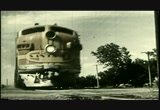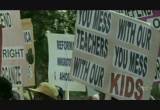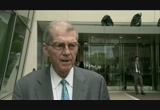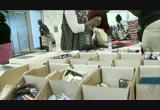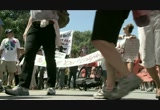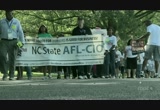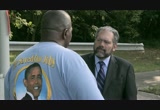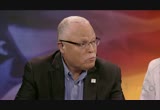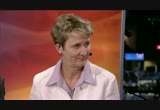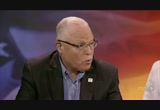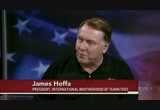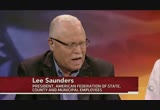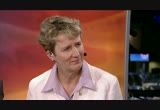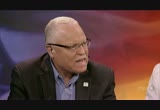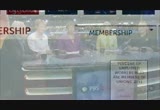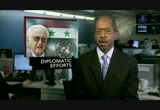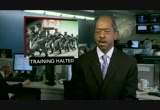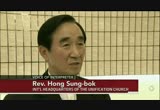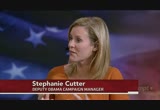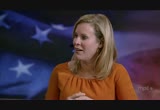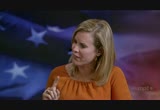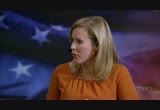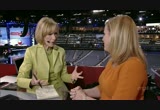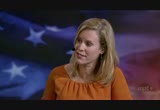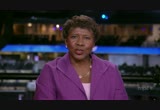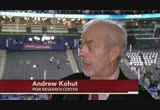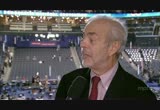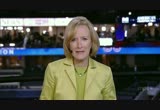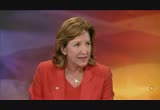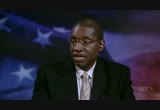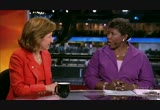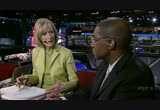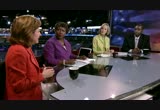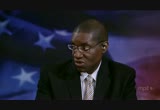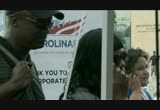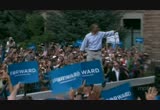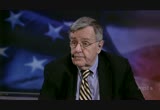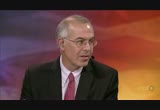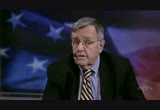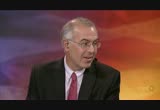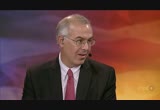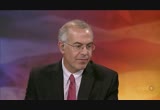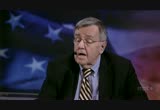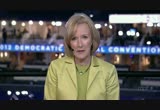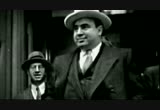tv PBS News Hour PBS September 3, 2012 6:00pm-7:00pm EDT
6:00 pm
captioning sponsored by macneil/lehrer productions >> ifill: good evening from the time warner cable arena in charlotte, north carolina-- site of the 2012 democratic national convention. i'm gwen ifill. >> woodruff: and i'm judy woodruff from our skybox overlooking the place where thousands of delegates will gather tomorrow. >> ifill: we begin this holiday with a look at the state of the labor movement, traditionally a critical base of democratic party support. >> woodruff: we preview the week and ask deputy campaign manager stephanie cutter about the obama team's goals. >> ifill: then we examine the challenges ahead for the democrats floor reporter ray suarez talks to pollster andy kohut. >> woodruff: with the festivities here in a southern city, we assess what the party needs to do to win the south in november. >> ifill: and why conventions
6:01 pm
can be an important organizing tool. hari sreenivasan reports on the effort to win battleground north carolina's 15 electoral votes. >> woodruff: plus gwen and i will be joined here tonight and every night this week for insight and analysis from newshour regulars mark shields and david brooks. >> ifill: that's all ahead on tonight's "newshour." major funding for the pbs newshour has been provided by: ♪ ♪ moving our economy for 160 years. bnsf, the engine that connects us.
6:02 pm
and by the alfred p. sloan foundation. supporting science, technology, and improved economic performance and financial literacy in the 21st century. and with the ongoing support of these institutions and foundations. and... this program was made possible by the corporation for public broadcasting. and by contributions to your pbs station from viewers like you. thank you.
6:03 pm
>> ifill: it's the democrats' turn and thousands of them arrived in north carolina today and over the weekend for their presidential nominating convention beginning here tomorrow evening. ray suarez is with us here in charlotte this week, covering the action inside and outside the convention center. today began with a traditional labor day parade. >> suarez: for almost a 130 years, americans have honored working people on labor day. the holiday came into being during a time of tremendous conflict between owners, workers, and government. these days it's noted more as the relaxed end of summer, a day for fun. this is carolinafest-- charlotte's way of showcasing american products, and honoring the workers who make them. delegates, elected officials and reporters have poured into charlotte, one of the capitals of the new south, for the quadrennial confab. the city was chosen after the
6:04 pm
president won three southern states on the way to the white house. now north carolina is looking less certain to stay in the obama column. don fowler, former chairman of the democratic national committee, says charlotte 2012 is a longterm investment. >> this convention being here will be useful and helpful to north carolina and other southern states. it really is a prospective investment by the democratic party in the south, and i think it will pay off. >> suarez: the mayor of charlotte says his city hosting the convention is a sign the democrats no longer surrender the south to the g.o.p. >> i think it means we're playing offense instead of defense, we're going into territory that republicans have traditionally taken for granted, and we're competing for those votes and i think that's exactly what we ought to be doing. >> suarez: republican vice presidential candidate paul ryan is also in north carolina while the man at the top of the ticket
6:05 pm
has no public schedule. ryan is trying to solidify recent polls here, trending mitt romney's way. this is one of those kinds of elections where a handful of states may make the determination not just of who your next governor is going to be or just who your next president is going to be, but what kind of land your kids will inherit. this is it. we can do this. the point i want to make to you is it is in our control. >> suarez: if the president scratches out another win here, it will be thanks in part to people like gloria goodwood, a cancer survivor who champions health care reform. >> what i do every single weekend is, i go out, i register voters, i'm on the phone calling. i run a data bank, and we are really trying to educate people about healthcare, about problems with the military, about all things. we don't just have a black
6:06 pm
president; we have a president of the united states. that's a people president. >> suarez: not all the people are happy. occupy protesters, joined by a big coalition of other pressure groups, took to the streets of charlotte, accompanied by a like number of police and reporters to bring their complaints to the convention about the president's lack of action on immigration, climate change, on bailing out the banks while millions lost their homes, since the president took office, william albritton says he's working harder for less money. >> i'm working at a warehouse now and i have a side job doing landscaping for a company, but i'm probably working 60 hours a week and i make right around $400 a week, before i was 40 hours a week and making $400. >> suarez: many of the protestors said there isn't much
6:07 pm
difference between democrats and republicans. they're skeptical of the president's links to wealthy donors and wall street. katherine fowler is still willing to give barack obama a chance. >> we have a message for the president. i support him, but i also want him to listen to me. we are concerned that the the middle class is shrinking. the working class is even more poor. >> suarez: labor day's grew out of the struggle to establish unions in this country. this morning union members set aside football, barbecues, and auto racing to march. organized labor was a big part of president obama's winning coalition four years ago. the democrats are getting ready to kick off their convention in right to work north carolina. the rev. mary loutensleger is a methodist pastor, and the wife of a former steelworker, who had no union. >> we need our workers to have
6:08 pm
some kind of power, some kind of say so to have their rights affirmed to be able to get medical, dental insurance, when they need it. >> suarez: dressed in north carolina blue, these united auto workers members wore their support for the president on their sleeve, you might say the freightliner truck builders credit mr. obama with saving their industry. >> with the help of president obama saving the big three. if we had let chrysler, chevrolet and gm go down, there would not be an international union, so he did save our jobs. >> suarez: that's the message the president took on the labor day campaign trail to ohio, where he reminded autoworkers of mitt romney's opposition to the g.m. and chrysler bailouts. >> when auto industry was flat lining, their play book was to let it go bankrupt.
6:09 pm
you would have been benched for good. that's not a good plan. more than one million people would have lost their jobs. for mid west it would have been another great depressions. >> suarez: workers in charlotte will hear from the president thursday night, when he officially accepts the democratic nomination for a second term. >> woodruff: we look now at the state of organized labor with the leaders of three unions. mary kay henry is president of the service employees international union. jim hoffa is president of the international brotherhood of teamsters. and lee saunders is president of the american federation of state, county and municipal employees.
6:10 pm
welcome, all three, to the newshour. lee saunders, let me start with you. on this labor day at a time when too many americans are out of work, how healthy is organized labor? >> we have taken our hits over the past two and three years especially in the public sector where we've had very, very right wing conservative governors steal our voices away from us, take collective bargaining away from us in wisconsin. scott walker limited our right to bargain and have a union. john kay sick tried to do the same thing in ohio. we were able to beat him back by more than a 2-to-1 margin. what doing now is mobilizing, organizing and educating our members. this is possibly the most important election organized labor has been faced with for many many years. we've under attack like never before and we have to fight back. >> ifill: mr. hoffa, here we are in north carolina, probably the least unionized state in the country. organized labor has made it clear that they weren't particularly happy with this choice. are you still unhappy? >> it is what it is. we're here and we're going to
6:11 pm
parts ate and play a major role in this campaign. and support barack obama. i think we could have had a better selection. now that we're here, i mean, we're all in this together. organized labor is 100% behind barack obama and the democratic party. so i think you're going to see a tremendous turnout here. i'm excited about being here. we have a lot of support here. a lot of our teamsters from this state and other states are here. so you're going to have a good participation and we're excited about it. >> ifill: yet, ms. henry, union membership is declining. mr. saunders mentioned what happened in wisconsin. he was practically carried in on a... he was praised constantly. wisconsin was a big point at the republican national convention a week. are you a step behind. >> i think we have to the state of labor by the state of all work people in this country. the labor movement is the last line of defense that working people have against the concentration of corporate power. and that when, as labor leaders, we stand up for getting people
6:12 pm
back to work and making sure that everybody pays their share, fair share, we're going to revitalize the american labor because we're standing up for all working people. >> woodruff: let me come back to wisconsin, lee saunders, because in this situation governor walker went after collective par gaining, made changes there. there was a huge recall effort. but labor and the democrats were beat back. wasn't that a significant setback for organized labor? >> well it was a setback. you have to remember that $60 million went into that state from the outside to help scott walker. we had boots on the ground. we're going to continue to have boots on the ground. it was a setback but we were worn in wisconsin. 75 years ago. because of patronage and disrespect that was shown to state workers, we were there 75 years ago. we're there today. we're going to be there tomorrow. we just got to organize like never before. our folks are excited. they are frustrated but excited because they understand the importance of this election in november. if you heard what was said in
6:13 pm
that republican convention last week, they were attacking labor. they were attacking working families. they were attacking the middle class. we've got to coalesce with our allies. we have to fight back. >> woodruff: jim hoffa, what about that? the wisconsin situation where the governor went out of his way to go after organized labor. collective bargaining rights. yet he prevailed. >> well, we had a tremendous support, lee and i were there. we were all in wisconsin. in madison, there were hundreds of thousands of people supporting that. there's a core there, a base that we can work on. we think we're going to win that state for barack obama. but you're right. it was a setback with regard to scott walker. and scott walker really signifies the worst part of what we're seeing right now. the complete republican party has veered to the right. you can see it in their platform. talking about national right to work. this wasn't true even four years ago. people getting up and basically beating their chest about how they beat unions, whether it's in new jersey, ohio, or
6:14 pm
wisconsin. you've never seen that before. i mean the rhetoric was so shrill coming out of that campaign that there's no idea there is a war on workers. they are coming after us. it's going to mobilize our members. our members feel that what's going on right now, they're out to take us out. they've said that. they have unlimited money. they're coming after us. it's going to mobilize our members to make sure we win this november. except you're here in charlotte because you support this democratic president. you believe he should be re-elected yet unions are spending a lot less money this year on democratic campaigns and a lot less on this convention. how do you square those two things? when you know that if you feel that you are under attack by republicans. >> well, we have more members contributing to political action than ever before in our union's history. i think together we're all spending as much as we have in past elections because we think our future is at stake. the economic well being of all working people is at stake in this election.
6:15 pm
so as jim and lee have said, we're going to put unprecedented numbers of workers on the ground to reach out to union members, their families, their neighbors. we're reaching out in latino and african-american communities especially because the republicans want to suppress that vote. in ways. we're not going to have it. we're going to make sure that we win in november for the champion for working people, president barack obama. >> ifill: lee saunders, how do you justify that? do you dispute that less money is being spent? >> i think we're all engaged. every single union is engaged. you have to take charlotte out of the picture out of the equation. >> ifill: why? t's over. this is a convention. after the convention we're going to be working every single day knocking on doors making those phone calls not only within union households but we're going to be talking with communities and talking to our coalition partners. we're going to be spending resources but we're going to have more people and more boots on the ground. the afl-cio will have 400,000 people, activists on the ground. increasing its number from
6:16 pm
40,000 to 80,000. the teamsters are doing the same thing. our engagement is greater this year and it's going to grow like never before. >> woodruff: what about the larger argument? i want to ask all three of you. i'll direct it to you, jim hoffa. the larger argument that in these tight economic times, the public has the right to expect employees of organized labor to take the same cuts that the private sector has taken. that was one of the arguments made in wisconsin, made in ohio and make in other states. >> it wasn't really true in wisconsin. in wisconsin there was a small deficit, and the unions were will to go sit down and make that up. he said i'm not interested in that. scott walker began by talking about the fact, he said, well, there's a deficit. we have to get rid of collective bargaining. when they called his bluff and said we'll sit down and negotiate with you right now, then he says no i'm not interested in negotiating with you. i want to take out collective
6:17 pm
bargaining. the real reason is they realized the backbone of the democratic party, the people that oppose them, is organized labor. we're the ones that have the boots on the ground. we have money and organization. they really have to take us out. it's not about the budget or pensions. whether its in wisconsin, ohio, new jersey, michigan, indiana. it's all the same thing. we are targeted because we are the backbone of the progressive movement in this country. >> woodruff: an extension of that same question, the public often looks at union members and says wait a minute. why can't they especially public service employees why can't they accept some of the same cuts that private sector workers have had. >> i think more and more members of the public are saying public service workers are the last remaining middle class jobs in our community. that's why tens of thousands of people poured into the madison rotunda in and said, "wait a second. we're not going to allow this governor to strip away the middle class standard of living that we've achieved in this state. we agree that we need to do is
6:18 pm
reach out to private-sector workers and lift their wages up. tax policy has to change that. workers being able to freely form unions have to change that and investing in a public education system where everybody has an equal opportunity is the way that we can get the middle class growing again. >> ifill: lee saunders, if i can ask you to answer judy's question but also how do you answer to your members, like so many americans, the economy is not doing well, that they should stay on the same horse. >> when we have had to sacrifice, we have sacrificed. we cannot accept the total burden. that's what's happening right now. jimmy was right. they are coming after us because we are organized. we have power. we have strength. this is a pure powerplay. make no mistake about it. the top 1% in this country want to have more power. they want to have more wealth. they want to do it at the expense of the 99% who are trying to play by the rules every single day. those are the folks we've got to mobilize and organize. >> ifill: but it's the 99% who are suffering under the current status co- >> the 99% is suffering because
6:19 pm
of the policies of george bush and because of the policies of john boehner and mitt romney and paul ryan want to push forward. that's what we've got to stop. >> that 99% see the president saved the auto industry. students will have a chance not to be deported to finish college. more jobs are being created under this administration than before. there is progress. >> woodruff: mary kay henry, lee saunders, jim hoffa, we thank you all three. appreciate it. you can visit our vote 2012 map center to find out more about labor union membership in each state. >> ifill: we're coming back with much more convention coverage, after the other news of the day. here's kwame holman in our washington newsroom. >> holman: large parts of southeastern louisiana remained heavily flooded today, almost a week after hurricane isaac hit. more than 100,000 homes and businesses still had no electricity and hundreds of people were in shelters. water was up to five feet deep across plaquemines parish.
6:20 pm
officials said for many, the damage ended up being worse than from hurricane katrina. president obama toured part of the area this evening, on the eve of the democratic national convention. in syria today, the embattled government pledged support for the u.n.'s new diplomatic envoy, lakhdar brahimi. the 78-year-old former algerian diplomat replaces kofi annan, who resigned last month after his peace plan failed to halt the country's civil war. in damascus, the syrian information minister voiced hope that brahimi will succeed. >> ( translated ): syria welcomed the appointment of lakhdar brahimi, and will offer him every possible help, the maximum assistance the way we did with kofi annan. we will make sure his mission will not lead to a blocked wall like what happened with kofi annan, when the external sides did not respond to his mission and international role. >> holman: meanwhile, the new head of the international red cross arrived in syria. he planned to appeal for greater
6:21 pm
humanitarian access to civilians caught in the fighting. thousands of syrians have become refugees, death toll and opposition groups say 5,000 were killed in the conflict in august-- the highest monthly death toll yet. the u.n.'s children's fund-- unicef-- estimates 1,600 people died last week alone. a nato soldier was killed today in a bombing in southern afghanistan. there was no immediate word on his nationality. meanwhile, the coalition has temporarily halted training for at least 1,000 afghan police recruits. that's to allow for new background checks, following a surge in afghan soldiers and police attacking their nato partners. the reverend sun myung moon died early today near his home in south korea. he'd been hospitalized with pneumonia. moon founded a religious movement that made him known worldwide and brought him critical scrutiny, especially in the u.s. followers of reverend moon were in mourning today and flags flew
6:22 pm
at half-staff at the international headquarters of the unification church in seoul, south korea. some said they were overcome by the loss. >> it's hard to accept this all of a sudden. i don't know how to express this feeling. since he taught us true love, we will live our lives by preaching true love throughout the whole world till the end. >> holman: for others, moon's passing marked a new beginning. >> we believe we can start again with a new look repaying the love we received from him sun myung moon. we have a lot of mixed emotions, but we will get it together and prepare for the coming future. >> holman: sun myung moon was born in 1920 in what is now north korea. he moved south during the korean war, and founded the unification church, mixing christian, confucian and traditional korean values. by the early 1970s the movement spread throughout asia and across the u.s. but moon faced allegations of brainwashing young recruits in
6:23 pm
the u.s.-- dubbed "moonies" by some parents, who said the church really was a cult. reverend moon he drew fire, as well, for the church's mass weddings. thousands were married at a time, with moon often matching the couples himself-- part of his docrtine of salvation through perfect marriages. the unification church now claims three million followers worldwide, but other estimates have ranged as low as 100,000. moon also created a business empire, including "the washington times" newspaper which he founded in 1982 and sold in 2010. but he ran afoul of u.s. laws in the mid-1980s, and served 13 months in federal prison for tax evasion. in later years, he handed control of his multi-billion holdings to his children. at his death, sun myung moon was 92 years old. his funeral will be held on september 15. those are some of the day's major stories. now, back to gwen and judy in charlotte.
6:24 pm
rev. moon died yesterday. and we turn to the road to re- election for president obama and vice president biden. stephanie cutter is the deputy campaign manager. i spoke with her earlier today. stephanie cutter, welcome to the newshour. >> thanks for having me. a pleasure to be here. >> woodruff: if governor romney's job at his convention last week was to introduce himself again to the american people, what is president obama's main task this week. >> we're going to get a couple of things done. first we're going to crystallize the choice in this election for the american people. we're not just speaking to people in this haul but to americans all across the country about the choice we have of whether we want to continue moving forward and building an economy meant to last with a strong middle class at its core or do we want to go backward to the same policies that crashed our economy and punished the middle class. that's what romney is promising. we'll crystallize the choice. we'll talk about some of the tough decisions the president has made over the past four
6:25 pm
years to move this country forward. it wasn't always politically popular but it was the right thing to do from saving the auto industry or beating back fierce lobbying by the big banks and wall street to pass wall street reforms. we never have to bailout a bank with tax payor dollars again. you know, so those tough decisions that demonstrate both strong leadership we've had over the past four years and then finally a path forward. where do we go from here? we've come through a very tough time. we've made progress. but as the president has said, we don't want to go back to where we were before this crisis. we want to do better than that. so the president will lay out a path forward. unlike last week where there was no tangible idea put on the table by mitt romney about he's going to take this country, we'll have some concrete achievable ideas that will demonstrate a real road map. anybody leaving here or watching on thursday night will understand what the future means under barack obama. >> woodruff: you start out making a contrast between president obama and what mitt romney is offering. but what the romney camp keeps
6:26 pm
saying is the real important question is, president obama today versus the promises he made as candidate obama. why isn't their question more important than the one you're asking? >> well, you know, with all due respect to what the romney campaign is asking, you know, we're going to run on our ideas. and our ideas to move the country forward. that includes what the president has gotten done over the last four years. i think at this point four years ago when we were at our convention in denver, nobody knew we were going to have to bail out the banks. nobody knew we were going to have to bail out the auto industry. nobody knew we were headed into a record recession. you must remember, when the president took the oath of office in the six months before that, we lost .5 million jobs. what did the president do? he moved boldly and swiftly to stem the crisis. then he starting putting the building blocks back together again. an economy built to last. in terms of promises, there are many things that he promised in 2008 that we will talk about here. the end of the war in iraq. he broke the back of al qaeda.
6:27 pm
we're drawing down our troops in afghan stafn. let's not forget that he killed bin laden. those are real promises in 2008. another promise in 200 is how we were going to strengthen the middle class. because the middle class suffered from this recession but they've been suffering for a long time. decades of policies that left them behind. that's the one thing that has been driving the president over the course of the last four years. you know, that's why we passed the ledbetter act so that women could be equal bread winners for their middle class families across the country. that's why we passedded health care reform to make sure that people's economic security didn't depend on their health security. we are going to be running on our ideas. we're going to be running on our path forward. we're very much looking forward to thursday night. >> woodruff: when one of your main democratic services asked is the country better off today than it was four years ago he said no. was he off message? >> i was sitting next to him
6:28 pm
when he said that. he was saying the same thing that we're all saying. that going back to where we were four years ago at this time is not good enough. we need to do better than that. yes, the recession hit. it was very painful time for many across this country. it still is. the president is putting those building blocks back together. 4.5 million jobs created over the past 29 months. we need to do better than that. better than where we were before the crisis hit. that's what governor o'malley was saying. >> woodruff: speaking of jobs, of course, today is labor day. jobs is the overriding question today. to voters out there watching you right now, stephanie cutter, saying, what is this president going to do differently to create a more robust job creation climate than what he's been able to do over the last four years? what's the answer to that? what can change? >> a lot could change. i think that the two parties could come together to get real things done in washington. let's not for get that the president has the american jobs act in front of congress for a
6:29 pm
year. that would create a million jobs right now. to be putting our construction workers back to work rebuilding our roads, bridges and highways, making sure teachers can stay in classrooms, giving tax cuts to small businesses that hire. these are good, tangible concrete ideas that we can do to move this country forward. i think the president has often talked about this election as, you know, the voters get to decide the direction of this country. are they happy with the gridlock? are they happy with the intransigence of the republican party whose number one goal over the past four years is to make sure that the president didn't get re-elected or are they going to send a strong message, hey, we want some progress. put progress ahead of your own politics and vote for this change in this election. many of the pieces of the president's agenda that have been stuck in the republican house of representatives will move. >> woodruff: so all the blame goes on the republicans? >> judy, i think that the american people understand across this country that president obama has woken up every single day to try to
6:30 pm
figure out how he was going to move this country forward. strengthen the economy, strengthen the middle class. he's had ideas on the table. we've made progress. real progress. 4.5 million jobs. that's three times the number of private sector jobs that were created in the bush recovery which, you know, dealt with the recession but nothing compared to what president obama was dealt with. we've real progress. the lily ledbetter act. health care reform, wall street reform. tax cuts. middle class families are paying $3600 less in taxes today because of president obama. >> woodruff: very quickly finally, clint eastwood was the surprise speaker at the republican convention. who is the speaker here? >> we don't have any, you know,... there's no clint eastwood sequel here. we've got lots of people speaking. i guess our are the real people from across this country. average americans who have participated in the country's
6:31 pm
recovery, whether it's the teacher who is making sure that opportunity is spread across the classroom, across the community or the auto worker who got her job back. because of the actions the president took. those are our surprises. these are stories that are powerful and i think will resonate across the country. >> woodruff: stephanie cut we are the obama campaign. thank you very much for being with us. >> thank you, judy. >> ifill: can democrats re- ignite the enthusiasm of 2008? andy kohut of the pew research center has been exploring shifts in attitudes to answer that question. ray spoke to him on the convention floor a short time ago. suarez: andy kohut, a couple of years ago the democrats were looking at a long-term advantage in party allegiance. what's happened during the obama years? >> they have a lot of ground to pick up. they lost their advantage. they had a 51-39% advantage over the republicans. it's now down to 5 points, 48-43. that's a big change in four
6:32 pm
years. it's mostly occurred among white voters who now favor the republicans or think of themselves as republicans by a 1 percentage point margin. four years ago whites were divided equally between the parties. >> suarez: when you collect those statistics, do you ask people about why? do we know what lies beneath this big shift? >> well, a lot of it has to do with response to president obama. this reflects the disappointment that many voters feel about the way things have gone in the country. since then. and the democrats are disillusioned. among the people who are still democrats, they're not following the news about the election the way they were four years ago. fewer of them say they care who wins the election. republicans have a plurality, an advantage on both of those issues. four years ago democrats, they were ready to go. now it's the republicans who are more ready to go.
6:33 pm
the democrats have to get things going. >> suarez: andy, is that different from previous cycles? if you're a supporter of the party that's in power at a time when americans are feeling pessimistic, isn't this just a natural outgrowth of what's going on in the country? >> it's partly a natural outgrowth but we've had a lot of shifting around. we had three or four national elections where we've gone from democrats win, democrats win, republicans win. now the republicans are ahead. there's a lot of volatility. even at a time when the public is pretty polarizedded. >> suarez: give us a quick look at your very telling statistics on young people. >> a good deal of this disillusionment is among republican... among young people because four years ago 90% of them said, obama makes me feel hopeful about the same percentage said i'm proud of obama when i see him. both of those numbers are 45, 46%.
6:34 pm
that's a 35 percentage point, 40% decline. extraordinary. >> suarez: have you seen something like that in such a short amount of time. >> no. but then again we had never seen the kind of burst of enthusiasm for a candidate among young voters or any age segment of voters the way we saw last time. it was an extraordinary thing. >> suarez: andy kohut, thanks a lot. >> you're welcome. >> ifill: and on our website you can take a quiz from the pew research center to determine your political party i.d. >> woodruff: as democrats gather in this southern city on the eve of the convention, we look at the changing political landscape of the south, with democratic senator kay hagan of north carolina. and kareem crayton, a professor at the university of north carolina school of law who studies race and politics. we thank you both for being with us. >> thank you, judy. woodruff: senator hagan, we just heard that report from andy kohut about sliding support for the president especially among
6:35 pm
white voters here in the south it seems democrats are particularly having a tough time. why is is that? >> i think there are several things. you go back to 2008. in north carolina we had close to 4.5 million people vote. then in 2010 we only had a little over 3 million vote. so 1.5 million people stayed home. i think the landscape changedded in north carolina during that period of time. i think a lot of people are wondering, well, what's happened? but when i look at what's happened in congress with the frustration, with the inability to get things done, i think the public has forgotten that when mitch mcconnell stands up on the senate floor and says, you know, i don't want to move legislation forward. i want this president to be a one-term president, it's hard for president obama to get his policies put forward. i mean the last week we were in session, we couldn't even get on a motion to proceed to a cyber security bill because of the obstruction going on. i think that message hasn't
6:36 pm
resonated with the public. >> ifill: professor cla ton, if what the senator said is correct and people are just so disheartened about washington, what about the south in particular is affected by this? is the south out of reach for a democrat like barack obama this time around? >> it's not out of reach he's definitely sailing into head winds. in addition to what senator hagan said, there are of course these long-term trends that certainly make it more difficult for democrats to compete, having to do in part with the enfranchisement of african-americans since 1965. once you get a large number of african-americans voting supporting the democratic party you get a distancing among some white voters in the south from the democratic platform in part some would say because the democratic platform went farther away from where we were but sometimes also because they weren't all that comfortable voting for issues having to do with african-american-favored interests. so those are things that i think
6:37 pm
democrats in the south running have to work against. putting coalitions together. north carolina has been a place where that's happened but it is a hard celtic larly in an economic climate where independent voters, many of them white, are in some ways disspirred and wondering what federal government is going to do to deal with jobs. >> ifill: can i ask senator hagan, a colleague of yours, senator jim webb of virginia, another big battle ground state was quoted as saying how can it be in the party of andrew jackson 28% of white working males support the democratic party. is that a long-term problem for the democratic party not only in north carolina but throughout the south? >> i think we've seen that historically over the last 40 years. but i do think that we have with the convention in charlotte, with the convention in north carolina this week, that people across north carolina are proud of the fact that the democratic party chose to have a convention here in north carolina. we are a party with a huge tept
6:38 pm
and we welcome everybody that you will see on the floor beginning tomorrow. if you walk the streets in charlotte today for the carolinafest, you've seen that over and over again with people of all races, all nationalities coming here to celebrate the feeling and the southern hospitality that's been extended to them. >> woodruff: as we said, kareem crayton, one of the things you specialize in is looking at voting rights. we know from what's been happening in the last several months of this year republicans across the country in particular moving to move on... restricting voter access. they talk about trying to limit fraud and eliminate fraud. the view from the democratic party is different. but my question is, if you take all that together, how much does that affect the democratic party's ability to do what it needs to do in the south? >> it is a serious assault on the work that democrats do to win. democrats, in order to be successful -- and in many places like north carolina they have
6:39 pm
been successful -- have matched significant turnout among african-americans and great turnout among independent to moderate white voters. it's been done on a number of, you know, issues having to do with jobs, et cetera. how do the voting rules affect it? limited voting limits the ability of african-americans to utilize sunday voting. voter i.d. rules in a lot of states have been adopted. that limits access to those who have driver's licenses. many poor, many older, many african-voters don't have it. these will be things that drive down the ability of african-americans to turn out. in a tight race, those small numbers matter. >> ifill: senator hagan, i want to follow up on that. it seems that you raised the question of voter suppression as democrats have. if you raised a question about redistricting which is also carved out districts which make it very difficult for any kind of racial mix to happen, i wonder how you see a path toward future democratic growth
6:40 pm
especially in a state that the president won by, what, a half a percentage point last time? >> 14,000 votes. i think two things. i do think that what you're seeing right now in north carolina with the republican-controlled senate and house and in 2010, the house or the senate went republican for the first time since about 1880. all of a sudden you're getting these suppression of the voting rolls. there's really no reason for it other than to suppress the democratic vote. i think that that's a huge problem. as far as redistricting, you know, you can look at current sitting senators and the redistricting map picked two houses from one county and put one woman in one strong democratic woman in a strong republican state district. >> woodruff: what do you do about that? >> i think the courts are going to have to be able to solve that issue to see if this is is abiding under the voting rights
6:41 pm
act. if not, then certainly we can change that. i i think that it's in the court system right now. >> woodruff: given the picture that the two of you have painted throughout this conversation, kareem crayton, what does this president need to do if he's going to have a serious chance of winning in november across the south not just in north carolina? >> i think two things. they probably are things that you've heard, i think, ms. cutter say in her interview. one is obviously he's got to articulate a message that ignites people who are excited about him in 2008, that this isn't a red or a blue america. this isn't a black or white america but there are issues that we are all concerned about that we need to work together to build. second, i think -- and this is the, you know, door-to-door talking to people idea that a lot of folks earlier in the panel were talking about -- getting people mobilized, showing up and getting every potential vote out there, so utilizing what's left of early voting to get people mobilized arch making sure that on
6:42 pm
election day as few obstacles are in place as possible so that people can get their ballots cast. >> woodruff: kareem kraiton and senator kay hagan thanks you both. >> ifill: thank you both very much. >> ifill: as the convention gets underway, democrats will be pitching their appeal to a national audience. but on the ground in charlotte, the target is much more precise, getting voters registered and to the polls. hari sreenivasan has our story. >> reporter: the convention may begin tomorrow, but in and around charlotte signs of november 6 are everywhere and so are signs of charlotte and north carolina's importance. in 2008, the democrats held their convention in denver, and it may have played a part in winning that state. the last time democrats won colorado was 1992. the party hopes that happens here in north carolina; a battleground state that president obama narrowly won. everything surrounding the convention is an attempt to energize the base, register new democrats and swing the election. >> it affects in a positive way, it's going to improve the
6:43 pm
visibility of dems in charlotte, to have the president here will help win this county. >> reporter: the sale of buttons, t-shirts, and obama gear are considered campaign contributions, and that means more opportunities to gather information on potential voters and supporters. buyers are asked for their names, phone numbers, email addresses-- all valuable information that will likely be used in get-out-the-vote efforts this fall. there will be another very visible way to see the importance of north carolina. when the events kick off tomorrow at the time-warner center, delegates from north carolina will have the best seats in the house; front and center. nathan gonzales is from the rothenberg political report and roll call. >> i think north carolina is important because it changes the math of the electoral college. if democrats are able to win north carolina it takes less of
6:44 pm
a stress off winning florida or ohio. north carolina is a microcosm of the groups that democrats want to target for the next generation. sub urban, affluent younger voters, african-americans voters and hispanic voters. those are all key to the coalition that president obama wants to win another term. >> reporter: in 2008, president obama-- seen here in blue-- eeked out a victory here by just 14,000 votes over senator john mccain-- seen here in red. the margin was only 0.3%. he was the first democrat to win north carolina since jimmy carter in 1979. the obama campaign is hoping north carolina's demographic picture-- a high african american population, coupled with an influx of younger voters and latinos will give them an edge in the longrun. but gonzalez says that could current polls have romney and president obama running dead even in the state. >> most of my friend and neighbors are hard core republicans and so it's good for charlotte, it's a beautiful city we all love it, it's good for the city, but they're not
6:45 pm
running out and voting for president obama because of it >> reporter: when the president speaks thursday night, permitting, in a nearby football stadium, it may look like a repeat of the culmination of the 2008 convention. that's when supporters filled the pepsi center in denver. the tickets to the finale are already sold out and the only guaranteed way to get tickets is to volunteer for the campaign nine hours over three shifts earns one ticket. but for the past few days, afternoon and evening thundershowers have rolled through, casting storm cloud over the convention. >> ifill: we've been capturing the official proceedings and the behind the scenes moments in more than 200 images from last week's g.o.p. convention in tampa and dozens already from charlotte. find a link to our flickr stream on our home page to take a look. >> woodruff: and with us tonight and all week are shields and brooks. that's syndicated columnist mark shields and "new york times" columnist david brooks.
6:46 pm
great to have you with us, guys. welcome back. >> thank you. you're in a news place. woodruff: the republicans have had their week. we're about to hear from the democrats. mark, what is the state of this contest? >> the state of the race, judy, is close. (laughing). i think that the democrats have you real... you heard andy kohut give a rather dreary and dismal portrait of where the democrats are and the lack of enthusiasm and excitement among them. i think that's what, first of all, has to be done this week is to drive up the positive feelings about this election and its importance to the democratic faithful before you even reach out to the other side. >> woodruff: yet we hear again and again, david, that there is enthusiasm lacking. that people are saying, okay, whatever. i'm not as excited as i was in 2008. whatever. i'll get around to voting or maybe not. >> you see it among the young, as andy said.
6:47 pm
you see it in certain key states. iowa, obama crushed mccain in iowa. tie right now. wisconsin, obama crushed in wisconsin. tied right now. you see that sort of thing in state after state. you also see the race incredibly close. if you look at the polls of what we've seen so far post romney speech maybe got a slight bump. rasmussen has put him up a little. the gallup poll shows basically no movement. they're basically tied right now. what i'm looking for in this convention is what's next? what is the agenda for the second term? when he came into denver four years ago he knew exactly what he wanted to do. it was to heal the political mess in the country. 2009 we knew exactly what he wanted to do. he wanted to ameliorate the fiscal crisis. 2010 health care. what's the big answer right now? what's the big problem the country faces. what is he going to do about that problem? that's the real thing i'm looking for this week. >> woodruff: mark, we heard stephanie cutter say we're going
6:48 pm
to hear specifics this week. they're going to talk about what the president is going to do to carry out the agenda that he started in the first term. >> she said what crystallized the differences so that means a little bit more comparative. we can hear mitt romney's name mentioned more than once. the republican party. but i think it's absolutely necessary, judy. there has to be a second act. there has to be... this is what it's about. i mean, the president is going to have a victory just as governor romney failed to be specific enough. if you want to turn a victory into any kind of a mandate or any kind of a summons for national action, you've got to lay out in advance to the voters what you stand for, what specifically you want to do that is different from what you've done and from what the other fellow wants to do. >> ifill: i wonder whether it matters who else speaks at this these conventions, the convention which is a renomination other than the president himself, whether it's bill clinton, there's the mayor
6:49 pm
of san antonio. >> i think it does matter. i mean the guy who is president right now is president because one of these early speeches. so these early speeches matter. i thought ann romney mattered. i thought clint eastwood mattered. i thought even the chair mattered. they all mattered. so i'm glad these things are still three days. condi rice mattered. there's an atmosphere that builds up. if it was just one speech, it would be just like a presidential address. we really wouldn't get nearly the sense of the person or the party we get from having three days. >> woodruff: when you get we're going to hear from ordinary citizens one of the things that the deputy campaign manager said is we won't have any surprise stars or speakers. is is that something that can make a difference? >> i think just one speaker can make a difference. that's bill clinton. bill clinton has passed into a different atmosphere, a different environment politically. he is above the pettiness and the fractiousness and the ugliness of contemporary
6:50 pm
politics. he now has a favorable ratings in the 60s acknowledged by republicans as well. i think he is a very, very forceful advocate. he think he can make a stronger case quite frankly for barack obama than barack obama can for himself. >> woodruff: really? i'm a little... i disagree. people like bill clinton, very popular even among republicans. they sort of wish he was still president in some sense. but he campaigned heavily in 2010 for democratic candidates. didn't notice a big bump. he campaigned heavily against scott walker in wisconsin. >> once. i withdraw the heavily. he did a lot more than barack obama did. >> that's right. he was there one saturday morning. >> if there is a big obama or a big clinton effect i think we have yet to see it. >> we disagree. oodruff: wow. ifill: early on in these conventions we're always watching for the campaign platforms and what they tell us. at the republican convention there were things in the platform that the romney folks
6:51 pm
said that's just what they think. we don't really buy into it. here they're presenting a platform apparently where they g this is barack obama's vision. what's the difference in that? >> well, i guess the first thing to say is that i think this is a unified party. i think both parties more than unified than historically they have been. this is famously a fractious party. the second thing -- and this has pluses and minuses -- obama campaigned stylistically as a very different sort of candidate, different sort of president four years ago. his policies have never been that unorthodox. so his policies have fit in reasonably well with the democratic mainstream. the people he hired in the white house have fit in reasonably well with the democratic mainstream. i do believe that's one of the reasons he has failed to keep the enthusiasm among young people and among independents because they look at the policies and they see, oh, i know what is. that's a normal democrat whereas they were hoping for something weird, unorthodox, something new. >> woodruff: is it realistic, mark, i mean getting back to gwen's question earlier to think
6:52 pm
that over a period of thee days and with the president's speech that the democrats can fire up the troops, get young people energized and excited again or is that just... i mean, is is the bar too high? >> it's a high bar, judy. but it's an aspiration that they need to do. they cannot come out of here with a sense ofeth or gee about them. as far as the platform is concerned, i think that the democrats taking a position unequivocally on same sex marriage is... especially in this state where it was on the ball hot in may just four months ago and went down by 61%, does show how the country has moved in the past eight years. 11 states in 2004, that was the decisive issue in the bush-kerry race as organized by karl rove and the white house to put it on the ballot. the country has moved enormously on that issue. i don't think there's any question which way we will eventually come down in favor.
6:53 pm
>> ifill: if the president was not fully involved in time for this convention, can you imagine this would have made it in this platform. >> joe biden on a sunday you recall on the air. absolutely not. i think it is, but at the same time every platform is a result in some part of a group organizing passionately, intensely and saying, look, this is important to us. and occasionally there's a nonnegotiable point made by a particular element of the party that says if you don't do this, we're not going to be engaged and involved. i think that there's no question that the democrats on gay rights matters have become committed in a way that they never have been before. >> ifill: final thought, david. think how that issue plays out this term may help the republicans a bit. i think in the decades ahead it will help the demate karates for sure. >> ifill: we have much more to talk about all week long so we
6:54 pm
look forward to chatting with both of you about it. you can catch more from mark and david also on the doubleheader. that's just one of many beyond the sky box features available only online. find six live stream channels on our website, including all of the official proceedings every day this week, as well as interviews with newsmakers, delegates and others. all that and much more is at newshour.pbs.org. >> woodruff: gwen and i and the "newshour" team will be right here tomorrow night and all week. our special convention coverage begins 7:00 p.m. sharp eastern time and continues until the gavel comes down around 11:00 p.m. eastern. speakers to watch tomorrow for include first lady michelle obama and san antonio mayor julian castro who will deliver the keynote address. >> ifill: again, the major developments of the day: as democrats arrived in charlotte, president obama again criticized republican mitt romney for opposing the auto industry bailout in 2009. later, the president toured hurricane damage in louisiana. romney issued a labor day
6:55 pm
statement, saying too many americans still don't know when they'll find work and start getting pay checks again. and the new head of the international red cross arrived in syria, urging greater humanitarian access to civilians caught in the fighting. and that's the "newshour" for tonight. i'm gwen ifill >> woodruff: and i'm judy woodruff. we'll see you online and again here tomorrow evening. thank you and good night. major funding for the pbs newshour has been provided by:
6:56 pm
and the william and flora hewlett foundation, working to solve social and environmental problems at home and around the world. and with the ongoing support of these institutions and foundations. and... this program was made possible by the corporation for public broadcasting. and by contributions to your pbs station from viewers like you. thank you. captioning sponsored by macneil/lehrer productions captioned by media access group at wgbh access.wgbh.org
284 Views
IN COLLECTIONS
WMPT (PBS) Television Archive
Television Archive  Television Archive News Search Service
Television Archive News Search Service 
Uploaded by TV Archive on

 Live Music Archive
Live Music Archive Librivox Free Audio
Librivox Free Audio Metropolitan Museum
Metropolitan Museum Cleveland Museum of Art
Cleveland Museum of Art Internet Arcade
Internet Arcade Console Living Room
Console Living Room Books to Borrow
Books to Borrow Open Library
Open Library TV News
TV News Understanding 9/11
Understanding 9/11
